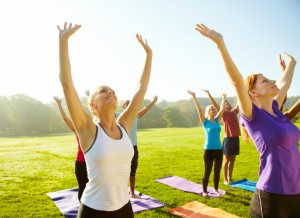By Deane Alban
Contributing Writer for Wake Up World
Sometimes we need to be reminded to connect with the Earth, with something as simple as riding a bike, planting a tree, or enjoying a picnic. It’s not only healthy for us but it’s healthy for the planet too.
Getting regular exercise is one of the best things you can do to boost your health and brain function, but exercising outdoors provides many additional benefits. So in the spirit of celebrating and appreciating this amazing planet we call home, I’m going to recommend you do at least some of your exercise outside, if you can possibly swing it.
Go out and play!
6 Great Reasons to Exercise Outdoors
Stress Reduction
Exercising outside reduces levels of the stress hormone cortisol more effectively than performing a similar activity inside.
[pro_ad_display_adzone id=”110028″]
Neuroscientists are discovering immersion in nature is a key to optimal health and brain function. Your Brain On Nature: The Science of Nature’s Influence on Your Health, Happiness and Vitality is a wonderful book that explores how our brains are inextricably linked to the natural world, and how we can benefit from enhancing that connection.
One surprising way spending time in nature is healing for us is the smell of the woods. Aromatic plants releases phytoncides, chemicals that make a forest smell so good. These substances have been found to reduce stress, lower blood pressure, and boost your immune system. (2), (3) The Japanese engage in Shinrin-yoku or “forest bathing” — an elegant way to describe spending time in the woods for therapeutic benefits. (1)
Vitamin D Production
Vitamin D is actually a hormone, not a vitamin, that our skin produces when exposed to sunlight. But between spending most of our time inside, wearing sunscreen, and living in northern latitudes, few people in North America and Europe get the sun exposure they need to produce adequate vitamin D. Give your body a chance to manufacture this essential nutrient by exercising outdoors in the sun at least some of the time.
There’s no perfect amount of sunlight for everybody; it depends on your skin color, your latitude, time of year, and more. But generally 20 minutes of exposure to a large area of your body (like arms or legs) a few times a week will largely meet your needs.
Better Sleep
Most of us are exposed to way too much artificial light at night and too little natural sunlight during the day. This unnatural pattern of light exposure contributes to short-term memory loss, inability to concentrate, mood swings, irritability, depression, as well as insomnia.
Exercising outdoors, especially in the morning, can reset your circadian rhythm, helping you to sleep better at night.
 Better Workouts
Better Workouts
Outdoor exercise is always more challenging physically and mentally than the indoor version. Bike outside and you’ll contend with wind, hills, potholes, and traffic whereas riding on an exercise bike is so boring you can do it with your eyes closed. Jogging on the beach will use more muscles in many different ways than jogging on your treadmill.
Studies found that people who exercise outdoors complete an extra 30 minutes activity per week. The majority of subjects also said they were more likely to stick with the outdoor activity in the future. (4)
Fun might have something to do with it!…
More Fun!
You might guess that most people would find walking outside more enjoyable than walking on a treadmill, and science backs that up. Numerous studies have shown that test subjects who exercise outside report enjoying it more (5) while other research shows (not surprisingly) that positive mental states encourage health and longevity.
Better Brain
The positive effects shown in these studies went way beyond what might be expected. Studies found that outdoor groups scored significantly higher on measures of vitality, enthusiasm, pleasure, and self-esteem and lower on tension, depression, and fatigue after walking outside. (5) Memory performance and attention spans improved by 20% after people spent an hour interacting with nature. (6) The scope of benefits is tremendous!
Thousands of tired, nerve-shaken, over-civilized people are beginning to find out that going to the mountains is going home; that wildness is a necessity; and that mountain parks and reservations are useful … as fountains of life ~ American Naturalist, John Muir
Go Out and Play!
Here are some simple ways to get outside more.
5,000 Steps?
I’m a huge fan of walking. It’s the only exercise I’ve done consistently over the years. Taking 10,000 steps per day is the gold standard of walking goals. While walking around your house and job, count/estimate your steps (or you can buy a pedometer cheap). And try to take at least half of your steps outside.
Better yet, besides setting out to take a walk for exercise, try incorporating outside walking into your lifestyle. Take a walk on your lunch break. Look for errands you can accomplish on foot such as going to the bank, library, or stores. Or make a trip into nature a regular experience.
Move Your Exercise Equipment
Who says your exercise equipment has to stay inside!? You can easily use your yoga mat, foam roller, weights, or resistance bands outside. If you have a covered porch or deck you can even consider moving serious pieces of exercise equipment, like your rowing machine or treadmill, outside for at least part of the year.
Even setting up your exercise area by a window or patio door can give you some of the benefits of being outside — a view, sunlight, and fresh air if you open the window. You may find you look forward to exercising more if you aren’t stuck in the basement or in a corner of a room.
 Just Hangin’
Just Hangin’
Not all outdoor activities have to be strenuous to contribute to your outdoor time. Some gentle activities you can add to your routine are bird watching, metal detecting, geocaching, walk your dog, playing frisbee, or nature photography. Anything that gets you outside and moving is all good!
Therapy in the Garden
Gardening may be the best outdoor activity of all. It is a winning combination of physical and mental activity along with creativity and mindfulness.
Simply being in a garden can be therapeutic. Studies found that people in their 60s and 70s who gardened regularly had a significantly lower risk of dementia than non-gardeners. And if you are growing edibles, you have the added satisfaction of eating healthy produce you’ve grown yourself.
Many residential homes for people with dementia have gardens on their grounds designed so that residents can walk through them without getting lost. The sights, smells, and sounds of the garden are said to stimulate cognition, promote relaxation and reduce stress. It’s been noted that when mental health patients are exposed to gardens, their symptoms of anxiety, agitation, aggression, and social withdrawal are decreased tremendously, reducing the ‘need’ for antipsychotic drugs. (7)
I’m definitely an outdoor gal. My idea of a good day is one that’s largely been spent outside. Besides my daily walk or bike ride, I strive to get extra outdoor time by eating, reading, taking phone calls, doing yoga, and meditating outside whenever possible.
What are some of your favorite outside activities?
Previous articles by Deane Alban:
- How to Increase Dopamine, the Motivation Molecule
- Ways to Improve Memory and Live Longer with Music
- Exposed: Why Cholesterol Doesn’t Cause Heart Disease
- Overcoming Resistance to Change: The Secret to Lasting Health
- Change Your Thoughts, Change Your Brain
- Advantame – the “New & Improved” Artificial Sweetener, Approved by FDA
- 5 Reasons You Aren’t Getting Enough Vitamin D.. and What You Can Do About It
- Five Common Food Additives That Can Damage Your Brain
- 18 Choices You Make Every Day That Keep You Up at Night
- Stress, Telomeres, and the Secret to Prevent Aging
- 20 Common Medications That Can Cause Memory Loss
About the author:
 Deane Alban holds a bachelor’s degree in biology and has taught and written on a wide variety of natural health topics for over 20 years. Her current focus is helping people overcome brain fog, “senior moments”, and other signs of mental decline now, and preventing Alzheimer’s and dementia in the future.
Deane Alban holds a bachelor’s degree in biology and has taught and written on a wide variety of natural health topics for over 20 years. Her current focus is helping people overcome brain fog, “senior moments”, and other signs of mental decline now, and preventing Alzheimer’s and dementia in the future.
The human brain is designed to last a lifetime, but modern life takes a greater toll on the brain than most people realize. Deane teaches the best ways to keep your brain healthy and stay mentally sharp for life at her website BeBrainFit.com.
[pro_ad_display_adzone id=”110027″]







